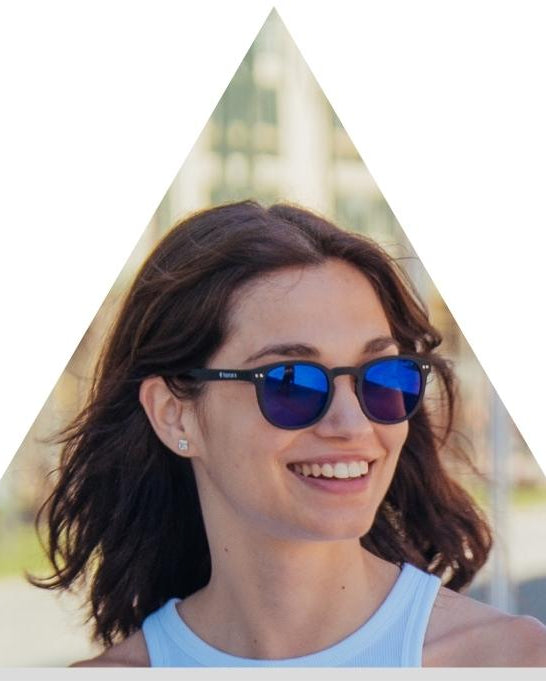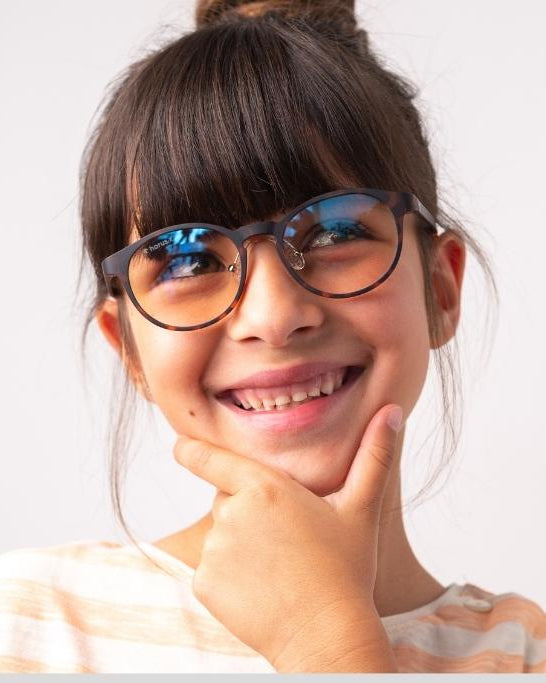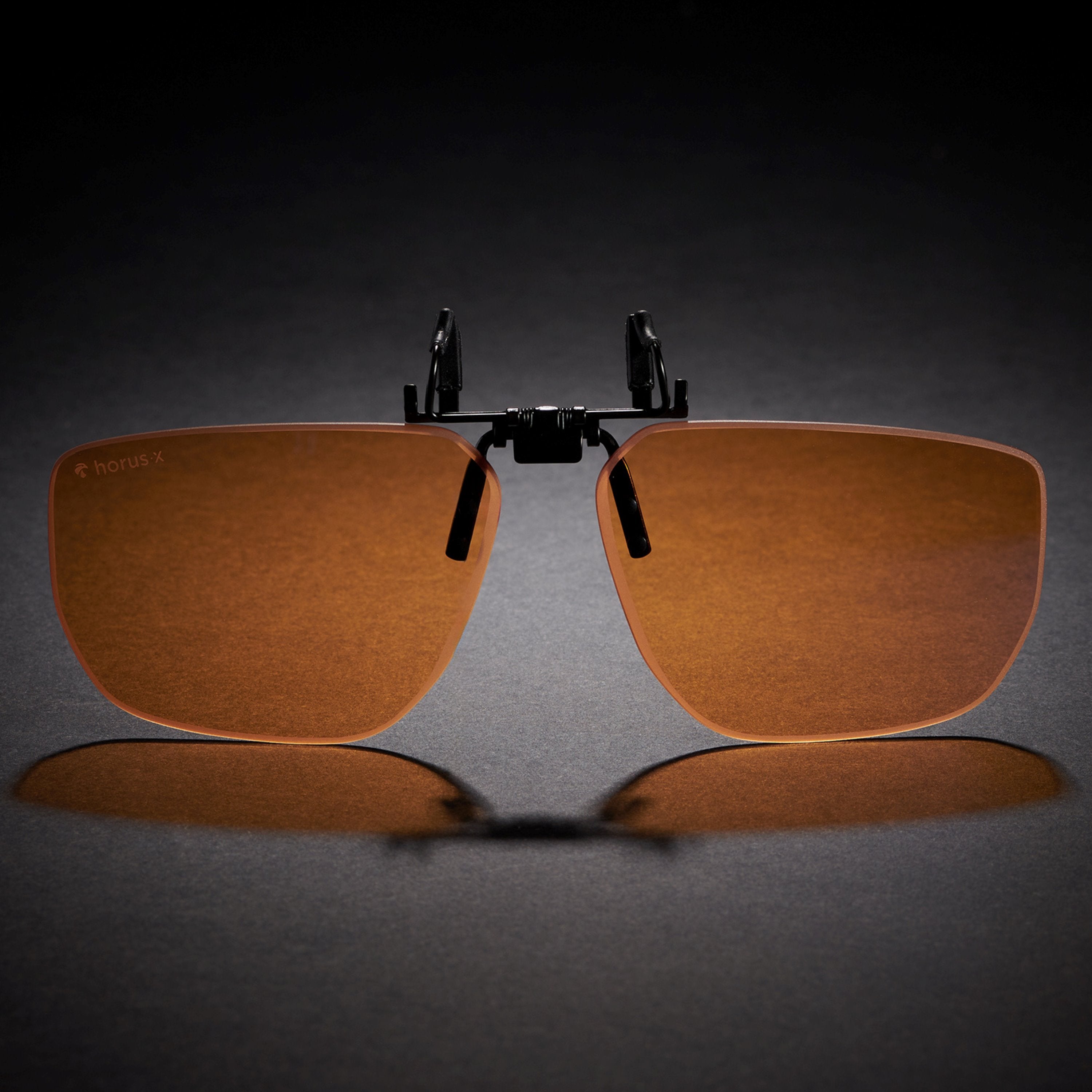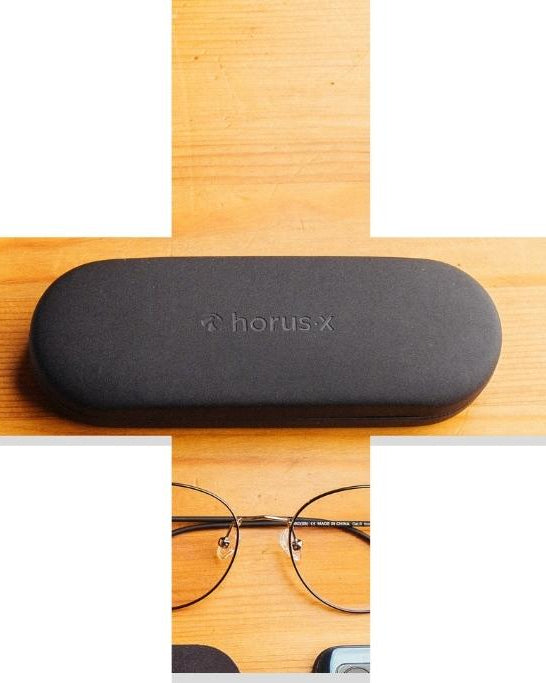If you’ve been reading us for a while, you probably already know how harmful the blue light emitted by screens can be for your eyes and your sleep cycle.
That’s why a pair of blue light glasses is a must-have if you spend hours in front of a screen.
But choosing these types of glasses can be hard. How do you know which ones really work? And which brands are trustworthy?
To find the best blue light blocking glasses brand, you need to know what information to pay attention to.
Compliance with standards, overall design, and the blue light filtration level are all important factors. This article presents a comparison of the best blue light glasses brands along with a comprehensive guide on how to choose your pair.
Best Blue Light Glasses Brand 2025
| Ranking | Strengths | Weaknesses | Actual Filtering |
| 1 - Horus X |
|
|
|
| 2 - Gunnar Optiks |
|
|
|
| 3 - Barner |
|
|
|
| 4 - Felix Gray |
|
|
|
| 5 - Pixel Eyewear |
|
|
|
| 6 - RA Optics |
|
|
|
| 7 - Amazon (generic brands) |
|
|
|
Others: Izipizi, Klim, Cyxus, GMG performance, Blueberry, Lusee
**See a full breakdown below
💡Important note: Among all these blue light blocking glasses brands, only one really explains the filtering technology behind the glasses (hint: it’s us). This is the ONLY real way to tell if your blue light glasses filtration is effective, so be wary of brands that don’t provide this information.
How to Choose Your Blue Light Blocking Glasses Brand
To choose the ultimate blue light blocking glasses brand, here’s the top 10 things to compare.
1 - Customer Reviews
The most important factor when selecting a brand. What do customers say? Are they satisfied? And when they’re not, how did the brand respond?
There are several third-party review platforms that can give you a general idea, like Trustpilot or Verified Reviews, for example:
- Horus X: 4.1 from 321 reviews
- Gunnar: 4.0 from 5,157 reviews
- Barner: 4.1 from 299 reviews
- Felix Gray: 3.1 from 6 reviews (😬)
- Pixel Eyewear: No TrustPilot reviews (😬)
- RA Optics: 3.1 from 4 reviews (😬)
You can also check online marketplaces (like Amazon, for example). Customers often leave comments evaluating the brand and products.
You can also look at bloggers’ or YouTubers’ reviews on the topic, which can provide even more details!
Finally, on the brand’s own website, you can see how the brand manages customer relations.
2 - Filtration Technologies
Since we’re talking about blue light blocking lenses, it’s only logical to look at how the blue light is filtered.
Yet in 99% of cases, no brand gives a precise percentage. Quite ironic, isn’t it?
You wouldn’t buy a pair of sunglasses without knowing they protect you from UV rays, right? The same should apply here about blue light exposure!

A good blue light blocking lens:
- Filters 100% of UV rays (UV400)
- Eliminates 100% of the ultra-harmful blue light between 380 and 400 nanometers
- Blocks between 50 and 90% of the harmful blue light across the extended spectrum from 380 to 450 nanometers (depending on use and sensitivity)
- Drastically reduces glare
To help you decide, here’s how much harmful blue light each of the best blue light glasses brands filters (tests done in 2022 by an independent lab):
For those who need prescription glasses, Horus X offers the best blue light filtration available. Alternatively, our clip-on glasses can attach to your regular prescription frames.
3 - Material Quality

High-quality blue light glasses aren’t made from flimsy plastic that breaks easily or scratches at the slightest touch.
The best pairs use materials designed for flexibility, comfort, and long-term durability.
Materials used in the best blue light glasses frames:
-
-
- Plastic (CR-39): The standard material for lenses. Plastic lenses support good optical quality and correct refractive errors. But, they tend to be thicker than other plastics (used by Barner)
- Polycarbonate (frame and lens): Used in ballistic protection for its legendary strength and lightness. Plus, it’s recyclable. A must-have (used by Horus X)
- Acetate (frame): A stylish, more premium material. It’s a natural or artificial fiber made from cotton, wood fibers, or synthetic fibers. Interesting, but also tends to be pricey!
- Bioplastic (frame): Good for the environment and effective! Make sure it really comes from plants (like G820 for example) and not actually made from petrochemicals, disguised behind a misleading term. If you want a true bio-based alternative, we recommend our castor oil-based bio-sourced glasses: you can’t go wrong!
- Plastic (CR-39): The standard material for lenses. Plastic lenses support good optical quality and correct refractive errors. But, they tend to be thicker than other plastics (used by Barner)
-
4 - Certifications
Even though there is not yet a specific blue light standard (the market is still evolving), some essential standards must be respected to sell glasses (though not everyone complies). In Europe, this is the EN ISO 12312-1 2013 standard. For North America, it’s the ANSI Z80.3 standard.
These standards guarantee among other things:
- ⚒️ Material quality
- ☇ Transmittance (in short, how much light passes through)
- 🛡️ Refractive power
- 👷 Durability
- 🔥 Flammability
These tests alone don’t ensure premium quality, but they are essential prerequisites for bringing eyewear to market.
There are also, within this standard, specific tests for blue light.
Check the packaging, product, and/or instructions when buying any glasses, because surprisingly, many products slip through and are not compliant at all.
5 - Warranties
If the blue light blocking glasses brand doesn’t offer any additional warranty beyond the basic manufacturer’s guarantee, be cautious!
With the quality materials used today, glasses can be so durable that if you take care of them, they can last a lifetime (unless you’re an elf… then you might need a second pair).
Check out Horus X’s lifetime warranty. Barner offers 3 years. Gunnar’s blue light glasses come with 1 year, and others offer similar levels of guarantee.
6 - Design and Style
Ideally, blue light glasses should be worn daily, so a stylish design is important.
Most brands have launched specific blue light glasses for men or women (although any pair can suit any person). Check if the blue light blocking glasses brand offers many colors and shapes (round, square, aviator, cat-eye, etc.).
For prescription glasses, this is a must-have. For clip-on glasses, you want to make sure they fit well on your current glasses.
7 - Price
Prices can vary from $30 to $300.
You can find many cheap blue light glasses on Amazon, for example, but the quality varies and the filtration rates are usually quite poor.
The most expensive blue light blocking glasses brands use better or bio-sourced materials, more solid or fashion-focused frames, and have a much higher filtration quality.
The choice is yours, but the worse the filtration, the less protected your eyes are.
8 - Customer Service
Does the brand offer good response rates and respond appropriately to issues or queries?
Can you have a refund, or an exchange, if needed?
Is the brand transparent with shipping times and what is its return policy?
9 - Origin and Sustainability
Check where the blue light glasses are made. Are the materials and lens' sustainable or recycled? Does the brand take back glasses for recycling? Does the brand have an environmental commitment?
10 - Brand Reputation
Finally, look at the blue light glasses brand’s overall reputation, how long they have been on the market, and if they keep modern and current.
Blue light glasses brands (like Horus X) focus on quality and innovation in blue light blocking technology.
The Best Blue Light Blocking Screen Glasses
1 - Horus X

This might be a somewhat biased opinion, but we’ve been fighting for over 10 years to build the best blue light blocking glasses. But we don’t expect you to take our word for it. Make up your own mind by checking out our comparison table of the best blue light glasses brands above.
2 - Gunnar Optiks

Gunnar is a well-known player in gaming and blue light glasses. While its technology was quite innovative until a few years ago, there seems to be some slow down now. The blue light lenses are still among the top in terms of filtration but could do more. Plus, they only offer a 1-year warranty? Come on, guys!
3 - Barner

Our friends from Barcelona do a great job. Varied styles, from a brand that’s respectful of the environment (with a B Corp certification). In terms of blue light filtration, it’s still a bit low for our taste, but it's a brand with potential.
4 - Felix Gray

Felix Grey is one of the biggest brands of blue light glasses in the US; however, they come with an expensive price tag, with models starting at $98.
Its big plus is that it offers prescription versions of most pairs of glasses, and they actually provide information on how much blue light is filtered. But, the bottom line is that this information shows they offer less protection than Horus X, and at a higher price point.
3 - Pixel Eyewear
![]()
A budget-friendly option that offers amber and clear lenses. While shipping and returns in the US are free, though, this brand only offers a 30 day money back guarantee - not a great sign for their longevity!
Pixel eyewear does offer some information on the blue light filtered, however, like other brands it doesn’t specify by lens color, nor does it have the same protection level as Horus X (claiming 95% at the “highest levels” but lacks any explicit wavelength information).
6. RA Optics

RA Optics claims to block 100% of blue light but give no information on which wavelengths its referring to.
Plus, these “health guru glasses” come with an extremely high price tag - starting at well over $150 for even the cheapest pair of blue light glasses and most hitting over $200. For a price tag that high, you’d also want a longer return policy than just 30 days…
7 - Generic Glasses (Amazon)
It’s well known, you can find everything on Amazon, even blue light blocking glasses. However, depending on the model, you might get either decent performance or lenses completely useless in front of screens. Like elsewhere, we advise paying attention to customer reviews, filtration data, standards and certifications, guarantees, shipping fees...
Other brands: Izipizi, Klim, Cyxus, GMG performance, Blueberry, Lusee.
The Best Blue Light Glasses According to Your Needs

Top gaming glasses
Gaming glasses come with either amber lenses or clear lenses, typically offering the highest level of blue light filtration available for long-term gaming marathons.
- Horus X Gaming One Revolution (ideal for gamers, perfect under a headset, $69.90) or Horus X Gaming One Biobased (slightly lighter, sustainable materials, $59.90): same amber lenses, same filtration level, we can’t pick a winner.
- Horus X Esport ProXima ($79.90): optimal protection, tech designed for pros, at an unbeatable price.
- Gaming Intercept Glasses - Gunnar Optiks ($69.90)
Top 3 blue light glasses for digital workers

- Horus X Ushuaïa ($69.90) or Horus X Stockholm ($59.90)
- Gunnar Optiks Berkley ($64.90)
- Barner Brands Sodermalm ($69)
Top 3 blue light glasses for kids

- Horus X Osaka ($34.90)
- Barner Brands Marais ($49)
- Gunnar Optiks Rush ($29.90) or Gunnar Optiks Cruz (from $29.90)
The Best Blue Light Blocking Glasses Brand: How to Choose Your Screen Glasses
- You’re right to wonder about the best brand of blue light blocking glasses! Not all brands offer the same levels of filtration. It’s so important to protect your eyes effectively from blue light, from short-term effects (headaches, eye strain, sleep issues...) to potential long-term effects (AMD...).
- Before buying, take the time to compare and verify all the data. Do these glasses effectively filter blue light? How much blue light do the different lens treatments actually block? (spoiler: they’re not all equal). What about the warranty? The materials used, customer reviews?
- Now that you have a wider and more objective set of criteria, you know better how to choose your future pair of blue light glasses. If you have questions, feel free to ask us in the comments or on social media!

















Comments
C’est la meilleure marque qui puisse exister 🥰